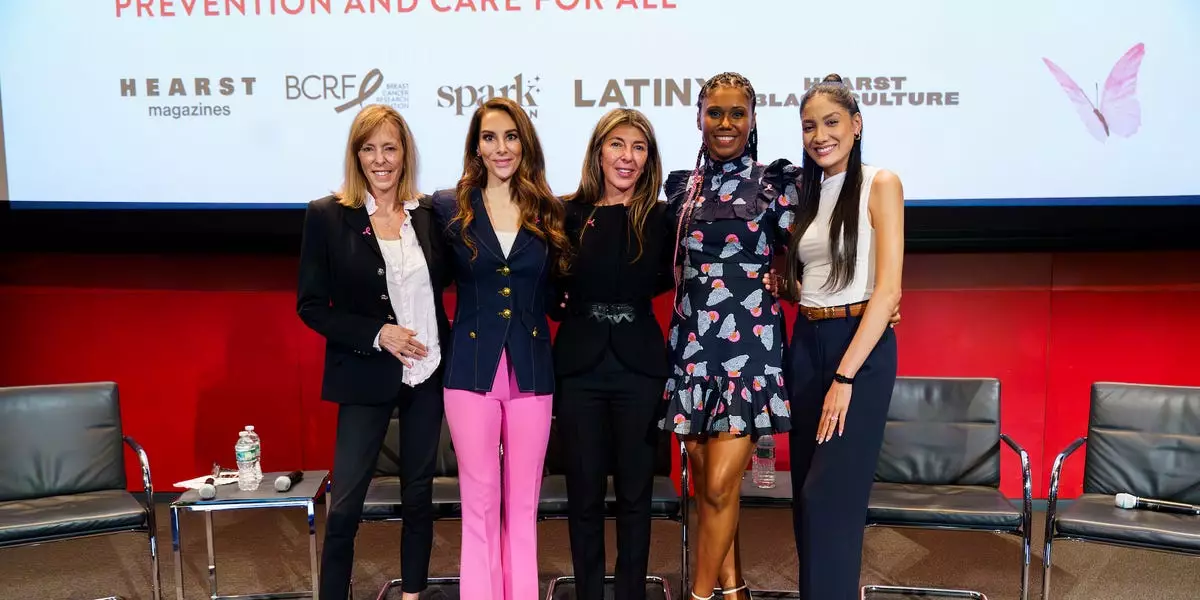In recognizing Breast Cancer Awareness Month, Hearst has collaborated with the Breast Cancer Research Foundation (BCRF) to hold an essential dialogue titled “United Against Breast Cancer: Prevention and Care for All.” This insightful discussion featured four women whose diverse backgrounds intersect around the universally impactful topic of breast cancer. The panel included prominent voices such as Nina Garcia, the editor-in-chief of ELLE and a board member of BCRF, actress Toks Olagundoye, cancer advocate Rebecca Porter, and oncologist Dr. Elizabeth Comen, who specializes in breast cancer treatment. The conversation, moderated by Lucy Kaylin, the editorial director of Hearst Magazines, delved into significant disparities in breast cancer outcomes among different demographics, emphasizing the urgent need for systemic change.
The sobering statistics highlighted during the discussion were notable, as Dr. Comen shared that Black women face a 40% higher likelihood of succumbing to breast cancer compared to their white counterparts. She further underlined the alarming disparity of diagnoses, noting that Black women are diagnosed with metastatic breast cancer at double the rates of white women. Additionally, Hispanic women encounter breast cancer more frequently at younger ages and show a higher prevalence of BRCA genetic mutations. This reality sets the stage for critical discussions about healthcare access and equity that affect marginalized communities disproportionately.
Voices of Experience: The Power of Personal Narratives
The panelists offered poignant insights grounded in their personal experiences with the healthcare system. They candidly explored how their cries for help often went unheard. Rebecca Porter encapsulated a prevalent frustration: “I hear day in and day out about women being dismissed or invalidated, and that feeling can lead to delayed care or worse,” she stated. Such sentiments echo the broader concerns women face, particularly those from minority backgrounds, who encounter compounded biases that thwart their access to quality healthcare.
Dr. Comen further emphasized the importance of women trusting their instincts when it comes to their health. “Self-examinations are crucial—it’s about knowing your body and what is and isn’t normal for you,” she advised. Emphasizing the power of self-advocacy, Porter shared her journey of navigating dismissive medical encounters that left her feeling marginalized, ultimately pushing her to remain persistent in seeking a diagnosis. Her testimony resonated with many attending, demonstrating that the empowerment to speak up can be life-saving.
Nina Garcia’s experience with a BRCA mutation brought uniquely personal challenges to light. Upon deciding to undergo a preventive double mastectomy, she initially struggled with how to share this profound decision with her loved ones. “It wasn’t easy to talk about it; I had always guarded my privacy,” Garcia recalled. The weight of such a decision drew her into a larger conversation with her audience, revealing the immense impact of vulnerability in the face of such trials. Her journey became a catalyst for other women to open up about their own struggles with breast cancer and the decisions that accompany it.
Toks Olagundoye also shared her journey through surgery and recovery while working on a major project. Despite fears of losing her job, she found unexpected support from her colleagues, particularly from Kelsey Grammer, who reinforced that her health should take precedence. “Being assured of my job stability meant the world to me,” she expressed, reminding others in similar circumstances that there can be spaces of understanding and compassion within competitive industries.
Throughout the panel, the importance of community support emerged as a recurring theme. Garcia emphasized that while medical professionals play a crucial role, personal connections with other women who had undergone similar experiences provided an invaluable sense of solidarity. “Nothing compares to another woman who has been through this. Their support prepared me mentally and emotionally for what I faced,” she noted. Such communal ties not only alleviate loneliness but can also empower women to share their stories openly, leading to a network of healing and shared strength.
Olagundoye reflected on how her illness reshaped her partnership with her husband, underscoring a dynamic shift in their relationship. “The experience brought newfound appreciation for each other’s roles as parents and partners. It was a stark reminder of life’s fragility and the importance of collaboration in overcoming challenges,” she concluded.
The “United Against Breast Cancer” conversation underscored that awareness, advocacy, and community are integral to combating this pervasive disease. The panel made it clear that persistent inequities in medical care, especially among underrepresented groups, need to be dismantled. Women’s voices must be amplified, and their rights to be heard, supported, and advocated for must be championed. Through collective experiences, sharing of knowledge, and unwavering resolve, society can foster an environment where quality care is accessible to all, and where breast cancer awareness transforms into proactive change for communities everywhere.

